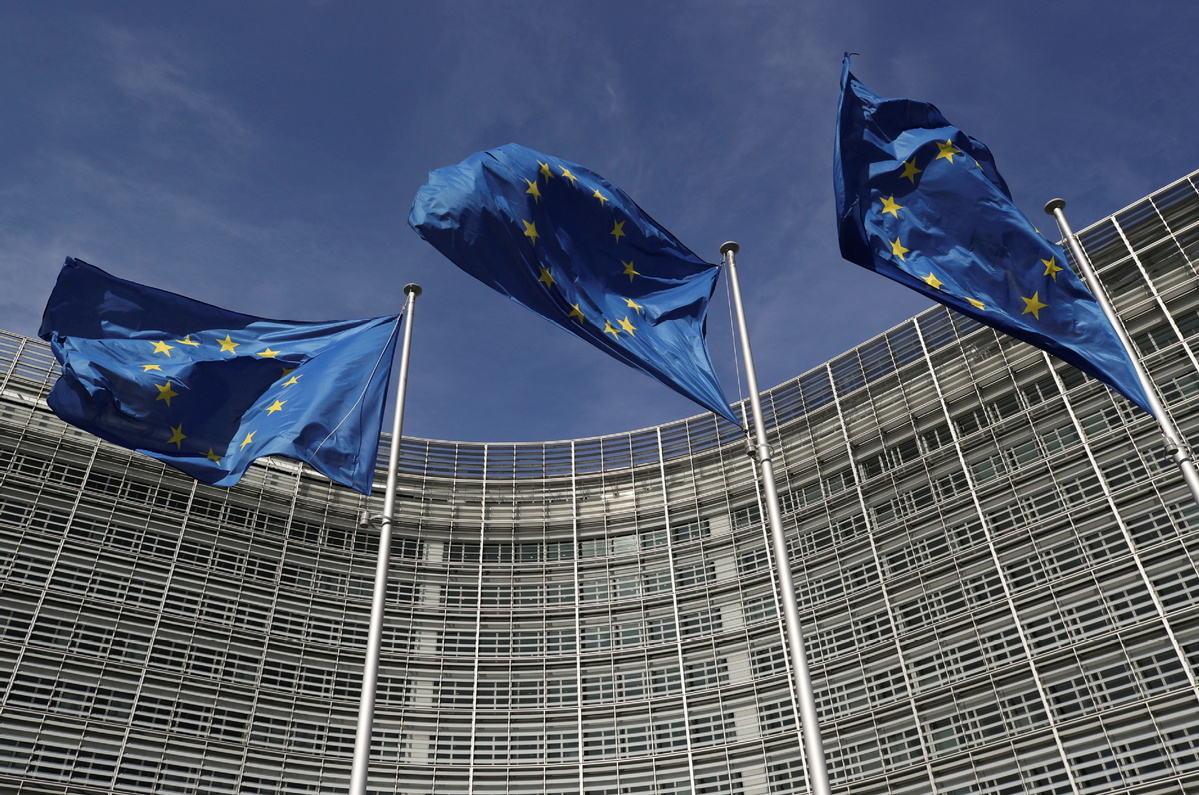EU shouldn't let Lithuania affect ties

European Union flags flutter outside the European Commission headquarters in Brussels, Belgium, March 24, 2021. [Photo/Agencies]
Sino-Lithuanian relations hit rock bottom after the Baltic country violated the one-China policy in 2021 by allowing Taiwan to establish a "representative office" under the name of "Taiwan" instead of "Taipei" in its capital Vilnius.
Despite China's countermeasures, Lithuania refuses to change its stance and continues to play the role of the United States' lackey, persuading the European Union to join the Washington-led anti-China clique and suspend the virtual China-EU Leaders' Meeting scheduled for April 1.
Lithuania has been playing the anti-China card for many reasons. Its relatively small population, territory and economy, and its history of being annexed several times by bigger countries have made Lithuania anxious about its security. After Lithuania joined the EU and the US-led NATO in 2004, its dependence on the US and the EU grew given the fast changing regional and international situations.
In 2019, Lithuania released an annual National Threat Assessment Report, which identified China as "a country with interests detrimental to Lithuania's security". And after a central-right coalition came to power in the country, Lithuania turned hostile toward China and in 2021 quit the 17+1 cooperation mechanism of 17 Central and Eastern European countries and China.
The last and most damaging anti-China policy move of Lithuania was to ignore the fact that the Taiwan question concerns China's sovereignty and territorial integrity, and allow the island to set up a "representative office" in Vilnius under the name of "Taiwan". Perhaps Lithuania has challenged China's core interest to prove its loyalty to the US and enjoy the "comfort" of the US-led security umbrella.
The Joe Biden administration, on its part, has been trying to strengthen the trans-Atlantic alliance, and include the EU into an anti-China front using the stick-and-carrot approach. And Lithuania has fallen for the US' ploy and ended up becoming a pawn in Washington's hands.
After Beijing took political and economic countermeasures against Lithuania for violating the one-China policy which the latter had vowed to follow while establishing bilateral relations, Lithuanian President Gitanas Nauseda said in January that allowing Taiwan to establish a "representative office" under the name of "Taiwan" was a mistake. Besides, some EU leaders have called out Lithuania on issuing provocative policies against China. But even after that, Lithuania did not stop its anti-China farce.
The Baltic country cannot force the EU to join the US-led anti-China clique, because the bloc has no reason to abandon the pragmatic and mutually beneficial China-EU partnership. More important, the trans-Atlantic alliance is full of differences and disputes over their strategic interests. The EU emphasizes strategic independence, especially when it comes to diplomacy and security, accords priority to European issues, and has been trying to make decisions independent of the US. In short, the EU will not blindly follow the US.
And despite the Biden administration making efforts to improve US-EU relations by, for instance, returning to the World Health Organization and the Paris Treaty, resetting NATO strategic rules, and strengthening dialogue with European leaders, it has not abandoned previous president Donald Trump's "America first "policy.
As such, the US and the EU may not agree on the ways to resolve their differences over important issues such as the US' sudden withdrawal from Afghanistan after almost 20 years of occupation, which left the country helpless and problem-ridden; the nuclear submarine disputes between the US, Australia and France; and the Nord Stream 2 natural gas pipeline built to supply Russian gas to Europe bypassing Ukraine.
China-EU ties are based on economic interests, and their cooperation has contributed to their respective development. China's rapid development over the past more than four decades has created great business opportunities for the EU, and China-Europe cooperation is complementary in nature. Hence, the US cannot force EU countries to damage ties with China.
In fact, even during the Cold War, Europe did not blindly follow the US' policy. France and the United Kingdom established diplomatic relations with China separately in 1964 and 1972, and the EU in 1975, much before the US.
Today, China and the EU support multilateralism and uphold free trade. Yet in the 2019 EU-China Strategic Outlook report, the EU portrayed China as an economic competitor, systemic rival and important partner, revealing its complicated policy toward China. It didn't project China as an enemy, though.
By continuing to cooperate with China, the EU can secure its long-term interests. China is the world's second-largest economy, and its market remains highly attractive. Also, in 2020, exports and imports between the EU and China increased despite the headwinds, with China surpassing the US to become the EU's largest trade partner. Given these facts, the EU cannot afford to end its cooperation with China.
Beijing and Brussels signed China-EU Geographical Sign Treaty and completed the negotiations on the Comprehensive Agreement on Investment which, if ratified by the European Parliament, will create enormous benefits for both sides.
Since China and the EU have so many shared interests, Lithuania shouldn't serve as an obstacle in China-EU ties by sowing the seeds of discord between the two sides.
The author is an associate research fellow at the Institute of European Studies, Chinese Academy of Social Sciences.
The views don't necessarily represent those of China Daily.
If you have a specific expertise, or would like to share your thought about our stories, then send us your writings at opinion@chinadaily.com.cn, and comment@chinadaily.com.cn.
- Healthy China-U.S. trade ties to benefit both countries and world
- CPC, KMT hold dialogue on cross-Strait ties
- Premier Li confident about China-Germany ties
- Focus on common interests conducive to better China-U.S. ties
- Japanese PM Abe visits NATO to deepen ties
- China, Kuwait vow to boost economic ties